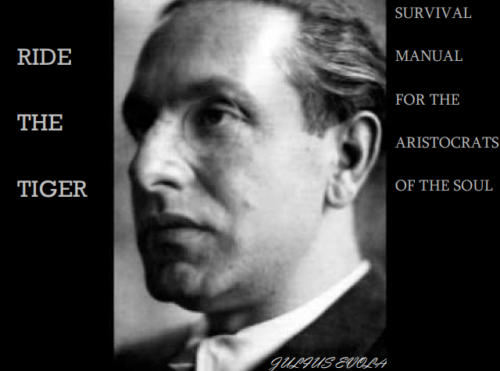
This reading continues on from here.
The tenth essay in Ride The Tiger is called ‘Invulnerability – Apollo and Dionysus’. Here Evola further describes his conception of an aristocrat of the soul as someone who feels very deeply and who is very moved by things. The modern man (the man of clay, essentially), only feels very shallow emotions, and quickly moves from one such shallow impression to the next.
In this essay, Evola touches on the truly aristocratic topic of deliberately exposing oneself to great trials and tribulations, for the sake of learning one’s true nature. Alchemists will recognise this mentality as the one necessary to burn away everything but the gold so as to learn to distinguish Spirit from Nature. The purifying fire is that which burns away body and mind and leaves one with one’s true nature – it is necessary because it burns away everything shallow, leaving only actions which arise from the depths.
A person who has done this may find themselves gifted with a “transcendent confidence” that is characteristic of the aristocrat of the soul. This is important because in purifying oneself down to the gold one also strips away all of the conditioned belief in life’s meaning. To proceed past this stage, the alchemist must find within themselves the will to assert a meaning to life independent of any outside source. Then one is invulnerable.
To open oneself without falling apart is not easy in an age of dissolution. Here Evola takes care to point out that it’s very easy to fall at the second hurdle. Just because mainstream religion is bullshit doesn’t mean that we should abandon it for wild paganism and barbarianism. There is more.
The eleventh essay is called ‘Acting Without Desire – The Causal Law’. Once a person discovers their true nature, they should also learn the ability to act without desire. This entails taking the correct action at any given time instead of becoming distracted by profit or loss, or by what other people might think of you. Doing what needs to be done.
This needs to be qualified, however. There are naturalistic desires, that arise from the biology of the human animal. These are generally to be avoided. There are also, however, heroic desires, that arise from something greater than the merely physical, from something transcendent. These may be acted upon.
An aristocratic person, then, thinks not in terms of sin but in terms of error. The concept of sin is impossible because God has long been repudiated; all that remains is adherence to standards that one sets from within as an expression of one’s true nature.
One ought to act with a mind to what is effectively a law of karma, in that actions have consequences, regardless of whether those actions conform to any conception of good or evil. Those consequences are real and should be regarded as such. This is fine because the real man of gold doesn’t just live, but rather manifests himself and his true nature in the world.
This is the end of the second part of the book. The next part is called ‘The Dead End of Existentialism’, and the first essay here is the book’s twelfth: ‘Being and Inauthentic Existence’. This deals with the two types of existentialism (as Evola sees it): the philosophical, academic tradition and the practical tradition exemplified by Jean-Paul Sartre.
Evola dismisses existentialism almost entirely, for the reason that the existentialist philosophers are too much a product of their times, and because they are not themselves interested in the world beyond. The existentialists are very materialistic and this disqualifies existentialism from being a philosophy that an aristocrat might be concerned with.
Despite this, existentialism can be credited with some things. For one, the idea that “existence precedes essence” serves to keep the existentialist in touch with the metaphysical and transcendent. It also helps to highlight the dual nature of the aristocratic soul, which, as described earlier, is much deeper than that of the pleb.
*
If you enjoyed reading this essay, you can get a compilation of the Best VJMP Essays and Articles of 2017 from Amazon for Kindle or Amazon for CreateSpace (for international readers), or TradeMe (for Kiwis).
